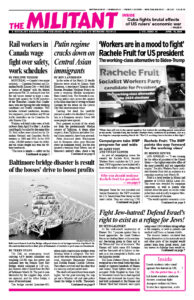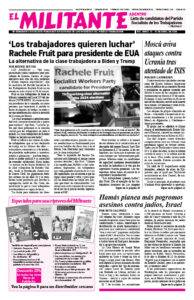For 65 years the U.S. government has carried out a far-reaching economic, trade and financial war against Cuba. This brutal policy has been continued by every one of the 13 Democratic and Republican administrations since 1959.
The U.S. rulers’ stated aim is to crush the spirit of Cuba’s working people and bring down the socialist revolution they have carried out and resolutely defend. In the face of this assault, Cuban workers continue to safeguard gains made on many fronts.
One example is the recently completed Havana International Book Fair. Despite shortages of paper to print large quantities of new books, transportation problems due to the shortage of fuel and spare parts for public buses, and other challenges, some 2.2 million people attended the event as it traveled across the country making literature and arts accessible on a mass scale. Held for the first time in 1982, this cultural event grew out of the conquests made by working people in Cuba, including the massive 1961 campaign that eradicated illiteracy in the country.
Washington’s economic embargo against the Cuban people has a severe effect on the country’s ability to import raw materials, like paper for books, resources to produce medicines, medical equipment, gas and badly needed agricultural and manufacturing supplies. The impact of these hardships has been compounded by the effects of the deepening worldwide capitalist economic crisis.
The Donald Trump administration placed Cuba on Washington’s “State Sponsors of Terrorism” list and the Biden administration has maintained this attack on Cuba. This imposes additional sanctions that restrict access to financing from foreign banks and institutions, the collection of payments for services provided by Cuba to other countries and the ability of Cubans living abroad to send money to their families on the island.
For the sole purpose of depriving Cuba of obtaining hard currency through tourism, Washington denies anyone from countries eligible for the U.S. Visa Waiver Program who visits the island access to the program. This has led many to stay away from Cuba.
The shortage of foreign exchange for fuel has caused regular blackouts. Frustrations over long electricity outages — sometimes daily for six to 12 hours, especially outside Havana — and food shortages led to a peaceful street action in Santiago de Cuba March 17. Headlines in the U.S. capitalist press read “Protests rattle ‘cradle’ of the Revolution” and “Shortages fuel unrest.” “Cuba Is Starving Its People” was the slanderous headline of a column in the March 25 Wall Street Journal, as if Washington’s decadeslong drive to starve the Cuban people into submission doesn’t exist.
In response to the actions in Santiago de Cuba, Beatriz Johnson, a leader of the Communist Party there, went out to meet with participants. Within hours a truckload of rice, sugar, milk and soap arrived in the city and was distributed to the population.
The following day, Cuban President Miguel Díaz-Canel dispatched leading government and party officials across the island “to listen, to dialogue, to explain the numerous steps being taken to improve the situation, always in an atmosphere of tranquility,” he told the media. The Cuban president joined these discussions himself, in Santiago March 21.
To try to meet the demand for food products Cuba has to rely on imports from countries willing to trade with the island in the face of Washington’s sanctions. It imports about 400,000 tons of rice a year from Vietnam to guarantee a basic supply sold through the government’s rationing system at a subsidized price.
While some transactions like this give Cuba relatively better terms, they are nevertheless done on the basis of the capitalist market. This often results in imported products not being delivered because of Cuba’s inability to pay.
No one is left on their own
The drive to increase production and deal with the problems Cuba faces has been at the center of efforts led by the trade unions.
“In everything accomplished lies the daily feats workers make to overcome the obstacles generated by the tightening of the U.S. blockade against Cuba in shortages of supplies, fuel, lubricants, spare parts, and tires,” said Yarieti Grotestan, secretary of the energy and miners union SNTEM, at a meeting in Las Tunas.
Its members have been at the forefront of a big effort to get energy plants badly in need of maintenance back on line. SNTEM’s members include linemen who are among the first to be mobilized to restore electricity following hurricanes that hit Cuba. They have earned the admiration of the Cuban population.
“Your work, done quietly, has taken apart the fallacy the enemy has constantly tried to sow about a failed state,” Luis Antonio Torres, a Communist Party leader in Havana, told a contingent of linemen who took part in a mobilization following Hurricane Ian, which had left a trail of devastation across the island in 2022.
“Your effort confirms that we can go through different situations, but we must always maintain confidence in the revolution, which doesn’t leave anyone on their own,” he added.
This commitment by workers in Cuba to defend their revolution was reaffirmed by Army Gen. Raúl Castro in a speech in Santiago de Cuba on the 65th anniversary of the revolution Jan. 1. “If the current challenges and difficulties are great,” Castro said, “let us get out of these difficulties, as we have always done, by fighting!”

